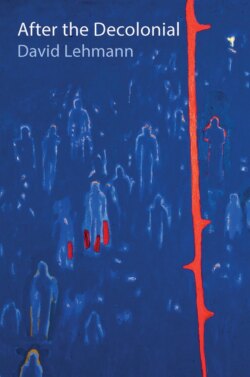After the Decolonial

Реклама. ООО «ЛитРес», ИНН: 7719571260.
Оглавление
David Lehmann. After the Decolonial
CONTENTS
Guide
Pages
Dedication
After the Decolonial. Ethnicity, Gender and Social Justice in Latin America
Preface: In the time of COVID
Acknowledgements
List of Abbreviations
Glossary
Introduction
The institutional and social setting
Critique of the decolonial
The colonial in anthropology
Popular religion, culture and ethnicity
Race, ethnicity and gender: in search of social justice
Evangelical Christianity
Indigenous movements and democracy
Notes
1 The Latin American Decolonial. The ‘decolonial’ in universalist mode: Said and Fanon
Said as liberal
Fanon as psychiatrist
Fanon as universalist
Fanon and Sartre: blacks and Jews
Fanon as sociologist
Latin American and Latin Americanist postcolonial theories
Quijano, Mignolo, Santos
The grounded decolonial
Philosophical lineage
Levinas and the decolonials
The true taboo-breakers: autonomous feminism takes on the world
Global feminism under fire
What if the Conquest had not happened?
Silvia Rivera Cusicanqui: gender, race and class
Intersectionality
Cultural and ethnic difference also intersect
Notes
2 Indigeneity, Gender and Law
The colonial in modern Mexican social science
Deep Mexico
The Zapatista uprising of 1994 in Southern Mexico. Indigenism in government and in scholarship
The Zapatista army as social movement
Interculturalidad: cultural difference in knowledge, education and law
Epistemology
Culture versus epistemology
The consciousness-raising role of interculturalidad
Anthropology, indigenism and gender
Legal pluralism as ventriloqual universalism. Normative questions, with special reference to India
Mexico
Colombia
Bolivia and ‘prior consultation’
State-sponsored indigenous classification
Brazil
Chile
Conclusion
Notes
3 Religion and Culture: Popular, Indigenous and Hegemonic. Indigenous religion is also popular Catholicism
The dialectic of the erudite and the popular
Bolivia: a crucible for the intellectual, anthropological and political intersections of ethnicity and authenticity
The authentic Indian, the Oruro Carnival and Pachamama: positioning the observer
Evo Morales: divisive but also a unifier
MAS and gender equality: tensions and intersections
Populism with an indigenist face
Conclusion
Notes
4 From Popular Culture to the Cultures of the People: Evangelical Christianity as a Challenge to the Decolonial. Pentecostalism and neo-Pentecostalism
The break with popular culture
Pentecostalism and Indian populations
Pentecostalism on the edge of the ‘abyss’: prisons and the drugs traffic
Conclusion
Notes
Conclusion: Democratizing Democracy
The decolonial
A discrete universalism
Gender
Women in religion and social movements
After the decolonial
Notes
References
Index. A
B
C
D
E
F
G
H
I
J
L
M
N
O
P
Q
R
S
U
Z
POLITY END USER LICENSE AGREEMENT
Отрывок из книги
For Maxine Molyneuxandin memory of Guillermo O’Donnell
It has been an intellectual, professional and personal roller-coaster rising and falling between ephemeral victories of progress and justice and long periods of despondency – the pain of Chile’s September 1973, of Argentina’s dirty war, of Peru’s Sendero Luminoso … Few of us do not have friends and colleagues who have suffered exile, imprisonment, torture and death, and that was before the unspeakable, indescribable cruelty of the current occupant of the Brazilian presidency and the irresponsibility of his Mexican counterpart, together presiding over the deaths of hundreds of thousands from disease and organized violence – a multiple of all the dictatorships together.
.....
The decolonial concept of indigeneity sets aside the multi-directional influences whereby, in the field of religion, popular Catholicism incorporates indigenous ritual and ceremony and indigenous ceremonies incorporate Catholic practices shaped by centuries of mixture. Outsiders are alert to the colonial or indigenous origins of the practices and symbols they observe, but those who perform them – whether they think of themselves as indios, cholos or mestizos2 – seem uninterested in such questions of authenticity. The discussion becomes even more convoluted when ethno-historians tell us that urban intellectuals in Bolivia are misinterpreting indigenous concepts like the now globalized Pachamama, or when we learn that indigenous healers in Chile, practising out of dedicated spaces in public hospitals and travelling the globe to administer their herbal remedies, are sought out by people who make no claim to an indigenous heritage at all.3
As with religion, so with race and ethnicity. The field is riven with markers of inequality, yet the frontiers are porous. Using a Bolivian case, I describe the perpetual exchanges of ethnic symbols and markers and the ways in which they serve nevertheless to solidify social inequalities and racial exclusion, something that cannot be said of art, music, dance and civic commemorations. Evo Morales solved the problem by inventing a pan-ethnic indigenism which gathered all the country’s indigenous peoples, indeed the entire population (except the lowland rancher elite) under its wing. Like the country’s nationalist 1952 revolution, which gave birth to a mestizo middle class, the new ideology disregarded the internal inequalities and fractures of the coalition, especially the lowland Amazonian Indians, and oversaw the continued development of a burguesía criolla – imperfectly translated as a ‘Creole bourgeoisie’.4 Morales made his political career as leader of the tightly organized and hierarchical coca growers’ association (the cocaleros) fighting for freedom to grow their crops. The coca leaf was a useful cultural symbol – the first of many deployed by Evo – but their demands were not cultural – they wanted freedom to grow and sell their crop and the cancellation of the government’s agreement with the United States to destroy their plantations.
.....